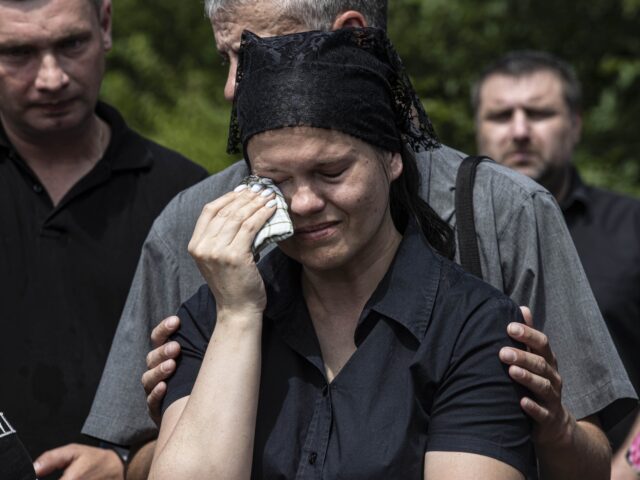Roman Chuprikov, an adviser to Russia’s top official for children’s rights, said on Thursday that suicides among minors have skyrocketed by 40 percent since 2020.
Some Russian doctors said even that horrifying statistic is too low because a vastly larger number of children unsuccessfully attempted suicide over the past two years.
Chuprikov is an adviser to Russia’s “ombudswoman for children,” Presidential Commissioner for Children’s Rights Maria Lvova-Belova. Lvova-Belova was appointed to the position by strongman Vladimir Putin in October 2021 for a five-year term.
Last week, Lvova-Belova visited the “People’s Republics” of Donetsk and Lugansk, the ersatz independent states carved out of Ukrainian territory by decree when Putin launched his invasion of the country in February, to work on making it easier for Russian citizens to adopt children from the war-torn region.
While his boss was working on that project, Chuprikov dropped the stunning statistics that “registered” suicides among children rose from 548 in 2020 to 753 last year.
Moscow Psychiatric Research Center expert Karine Keshchyan was quoted by Radio Free Europe (RFE) on Thursday warning “the number of attempted suicides among children is much higher” – so high that psychiatrists cannot keep up with the surge.
Keshchyan added the true number of attempted and completed child suicides is difficult to determine because “their parents often refuse to seek professional assistance.” RFE suspected the Russian government is not eager to tabulate and publish the true statistics.
A June RFE report on child suicides noted the number of annual suicides climbs to 2,500 in Russia if teenagers are included, roughly twice the per-capita average of Western nations. Chuprikov’s statement on the subject, and the increasing focus Putin is placing on Lvova-Belova’s office, reflect growing media interest and public anger about the child suicide wave.
RFE cited several reasons for Russia’s increase in child suicides, including Putin’s insistence on “adding military, patriotic, and religious components to otherwise standard school curriculum,” which makes children from dissident families and ethnic minorities feel ostracized and depressed. Some parents described their suicidal children as victims of extreme bullying, from both fellow students and school staff.
Russian suicide investigator Aleksei Kasatkin told RFE that young suicides “always go up in the spring during end-of-term exams.”
Kasatkin said another problem is that Russian social services are heavily focused on “underprivileged families where people drink alcohol, smoke, and brawl,” but most suicides are occurring among “restless” children from “average, middle-income families.”
RFE noted that Russia’s schools have “little support” and are “often unprepared to intervene in cases of troubled pupils.”
They will be even less prepared after a proposed cut in funding for school psychologists, and there are few places for children to turn outside schools as families and communities disintegrate. Russian psychologists often choose not to refer cases of clear child abuse to the police because brutal police involvement is more likely to make bad family situations worse. An astounding one in 70 Russian children is currently living in orphanages.
High suicide rates among Russian youth have been on the global humanitarian radar screen for decades, although the surge of children younger than teenagers killing themselves is new. Russian psychologists in a 2012 Washington Post piece lamented the Soviet Union’s merciless destruction of Russian community and family in favor of total obedience to the collective State, a psychic wound kept raw by Putin’s insistence on hyper-nationalism and loyalty to his regime.
“In the Soviet era, suicide was considered an affront to the state, the failure of a citizen to fulfill his responsibility. Psychiatry was more often associated with punishment than with therapy, and that left a stigma and mistrust of mental health care that persists,” the Washington Post observed.
Some Russian parents blame the Internet for making children more prone to suicide. In 2017, Russia made “persuading others to commit suicide” a crime, and communications agency Roskomnadzor began banning thousands of web pages and discussion groups that allegedly encouraged suicidal behavior.
As always with Russian censorship, critics accused the initiative of going too far, charging Putin’s government with using the anti-suicide crusade as an excuse to crack down on political dissidents. The crusade against dangerous online material had little evident impact on Russia’s rising youth suicide rates, and some very bad things are still slithering through the censorship barrier – the infamous Blue Whale “suicide game” pushed on children through social media had an especially high body count in Russia.
According to government statistics, child suicide is more common in rural areas, where people lead isolated lives under difficult conditions; girls attempt suicide more frequently, but boys are more likely to succeed; teenagers make the attempt more often, but young children are more likely to succeed, in part because they are more likely to choose brutally effective methods like hanging themselves or jumping off tall buildings.
The remedies recommended by Russian psychologists and international observers begin with calls for more child care funding, but quickly move into major cultural shifts that seem unlikely in Putin’s Russia.
The government has little interest in reforming schools that pressure alienated children to kill themselves. Russia’s sharp demographic decline is weakening family and community bonds – fewer children are born, while those who arrive face more isolation and unstable family life. Substance abuse looks like an intractable problem, growing worse after the Wuhan coronavirus pandemic, and worse again after Russia invaded Ukraine.

COMMENTS
Please let us know if you're having issues with commenting.